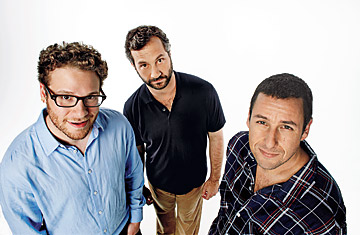
Portrait of Seth Rogen, Judd Apatow, and Adam Sandler.
Judd Apatow is working much harder on this article than I am. He wants to meet at 8 a.m., suggests six different events I can accompany him to and sends me more e-mails checking on my progress than my editor does. The two-minute video interview that I promised Time.com turns into Apatow taking my camera, directing me for 15 minutes and editing it himself. It's not entirely surprising--after all, I'm lazy--but it helps explain how Apatow has become the most influential person making comedy in Hollywood. Partly it's that he's funny. But mostly it's that talent is far less important to him than hard work. We like to think of comedians as people who throw out quips from behind a martini (Dorothy Parker) or a bong (Tommy Chong). But if Horatio Alger had written tales about boys who labored tirelessly to fulfill their dream of making movies full of penis jokes, he would have written about Apatow.
After he struggled for two decades in the worlds of stand-up comedy, television and movies, Apatow's plugging away suddenly paid off: he broke out as the creator of a genre of foulmouthed straight-man-love movies--the bromance. The first movie he directed, 2005's The 40 Year-Old Virgin, earned more than four times its cost at the U.S. box office. This enabled Apatow to produce all the scripts he'd been studiously stockpiling, making seven movies in 2007 and '08--Knocked Up (which he also directed), Superbad, Walk Hard: The Dewey Cox Story, Forgetting Sarah Marshall, Drillbit Taylor, Step Brothers and Pineapple Express--and inspiring a slew of imitators. He was the first to show that our porn- and profanity-saturated culture is actually underpinned by churchgoing morals. Crudeness became a cover for sensitivity; he created a generation of Alan Aldas who talk like frat boys. Compared with the comedies that dominated the 1990s--movies by the Farrelly brothers, Jim Carrey and Adam Sandler in which over-the-top characters triumph over an evil dumb guy--Apatow's movies are bildungsromans in which low-key guys push aside their comic books and triumph over themselves. Imagine Porky's if, instead of getting revenge on the strip club, Pee Wee and Meat had a long talk about life goals, met nice girls and raised children.
Apatow's new movie, Funny People, is the one he hopes will turn him from a mass producer of comedies into a filmmaker. It has a tragic premise: Sandler plays a lonely, selfish comedian who has received a terminal-disease diagnosis. It's got no set piece to assure laughs--no chest-waxing like in Virgin, no crowning baby like in Knocked Up. It's complicated enough that it's the first movie Apatow has made that has a bad title, a bad poster and bad commercials. And if it doesn't do well, the creative freedom he has earned from studios could come to an end.
But for Apatow, the goal was simple. "I wanted to see how funny I could be without making the choice that every 10 minutes something big and visual had to happen," he says. "People like the comedy more when they care about the characters. That's what I learned from the last two movies. This movie is just taking that one step further." For all his sex-drenched crudeness, for all the e-mails he sends me worrying about ulcers, Apatow is a bouncy, way-too-happily married dad who wants his audiences to know how great life is. And, more important, to remind himself.
The Comedy Nerd
